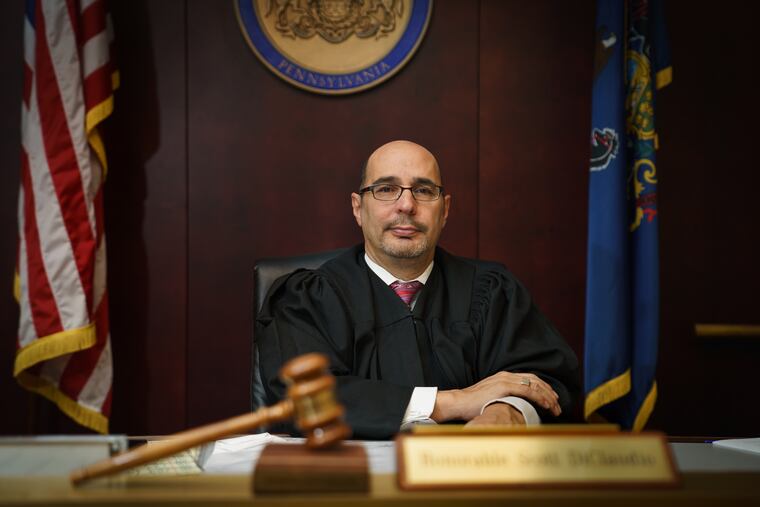In an unusual hearing, a Philly judge rebuked a prosecutor over how the DA’s Office handled a murder appeal
Common Pleas Court Judge Scott DiClaudio hurled insults at Assistant District Attorney Michael Garmisa and admonished the DA's Office for more than an hour.

A Philadelphia judge on Thursday took the unusual step of summoning a prosecutor to his courtroom to publicly admonish the District Attorney’s Office over how it conducted itself while seeking to overturn a woman’s murder conviction.
For more than an hour, Common Pleas Court Judge Scott DiClaudio did little to mask his frustration with how prosecutors handled the case of India Spellman, who was freed from prison earlier this month after DiClaudio agreed with prosecutors’ request to vacate her conviction in the 2010 murder of Navy veteran George “Bud” Greaves. Despite that outcome, the judge accused the prosecutor’s office of being “cavalier” in its reinvestigation of the case, and he frequently hurled insults at Assistant District Attorney Michael Garmisa.
Garmisa, also clearly displeased, called some of DiClaudio’s questions irrelevant and suggested that the hearing itself — which appeared to have no other purpose, and which was conducted before a courtroom gallery of spectators unconnected to the case — was inappropriate.
The judge was not swayed.
“Maybe you’re just not sharp enough” to understand a question, DiClaudio said at one point. At another, he summoned a sheriff’s deputy to the room and said he would be happy to have a hearing to determine if Garmisa’s reluctance to answer amounted to contempt of court.
DiClaudio did not ultimately discipline Garmisa or the DA’s Office, and the hearing had no impact on the underlying case. DiClaudio had already agreed to throw the conviction out, and prosecutors declined to retry Spellman because they said she’s “likely innocent.”
Still, the proceeding was another example of the tense relationship between District Attorney Larry Krasner’s office and some judges — including DiClaudio, whom Krasner unsuccessfully tried to disqualify from hearing criminal cases several years ago.
If nothing else, Thursday’s quarrel could heighten animosity between two key players in the city’s criminal justice system: Garmisa, who supervises a unit dedicated to overturning problematic convictions, and DiClaudio, the judge who is assigned to rule on many of those efforts.
The case at issue was the now-overturned conviction of Spellman, who had been accused of fatally shooting Greaves, 87, outside his Cedarbrook home 13 years ago. Last year, prosecutors filed paperwork asking DiClaudio to throw the case out, in part because they said key evidence had been improperly withheld from her trial attorneys.
They also went on to support the assessment of Spellman’s appellate lawyer, Todd Mosser, that Spellman had a credible alibi. Spellman contended she was at home using Facebook and talking on the phone when Greaves was killed.
But DiClaudio on Thursday suggested prosecutors had done little to investigate that alibi, and said he had been the one coming up with ideas for how they could assess its validity. He peppered Garmisa with questions about what steps the office took in the case and when, and showed little patience when Garmisa offered answers that expanded beyond “yes” or “no.”
“May I finish answering?” Garmisa asked at one point, to which DiClaudio interjected: “No.”
The judge — who had already said he didn’t find Spellman’s alibi credible — went on to call the office’s attempt to reinvestigate the case “severely lacking” and “cavalier.” And at times, he took swipes at Garmisa’s professional history, asking if Garmisa — who was a defense attorney before he joined the office in 2018 — had prosecuted a jury trial before.
DiClaudio also took issue with a step Garmisa had taken at a hearing earlier this month. During that proceeding, Garmisa had handed the judge a letter from one of Greaves’ relatives, moments before the judge was preparing to rule on Spellman’s fate. Instead of reading it, DiClaudio crumpled the letter up and dropped it behind him, a gesture mentioned in media coverage of the case and that later attracted criticism on social media.
DiClaudio said Thursday that the letter was unsigned and undated and that he’d disregarded it because it had “no evidentiary value” or bearing on his decision. At one point, DiClaudio asked if Garmisa had spoken to the woman who wrote the letter. As Garmisa sought to explain the totality of the office’s contacts with relatives, DiClaudio cut him off and said: “I’ll ask it slower,” before repeating the question.
Finally, DiClaudio challenged the notion that he had unnecessarily delayed ruling on Spellman’s case, walking through a timeline of events that he said showed he’d given it significant — and timely — attention. He also said prosecutors had taken more time than he to review the case and reach their own conclusion.
Then, with barely any warning, the judge apparently decided he’d had enough.
“You’re excused,” he said to Garmisa, before ending the hearing and walking off the bench.